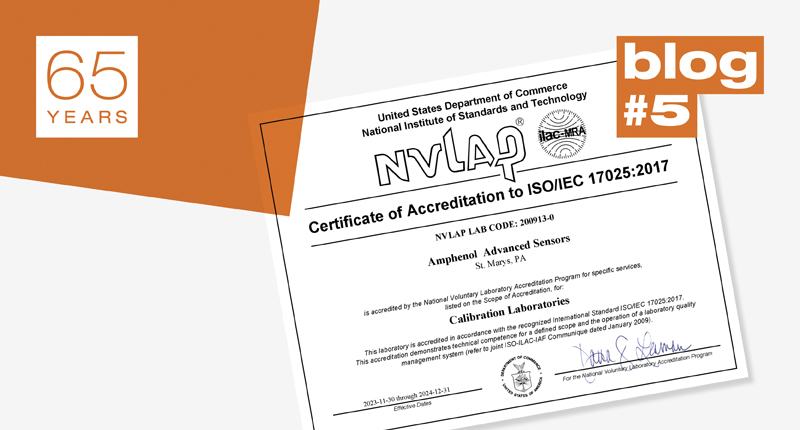Having delved into the history of the various Kaye measurement systems in previous blog posts, this edition is dedicated to the essential service offerings that go hand-in-hand with Kaye's validation systems. In part 3 of this blog post series, we already addressed the necessity for traceability in calibration. From the very first Kaye validation systems, this traceability was ensured by the Kaye IRTD-400 temperature standard. However, complete traceability in relation to national standards is only ensured by the necessary accreditation. This edition will shed light on what this means in concrete terms.
What does traceability to a national standard mean?
Traceability to a national standard refers to a direct link between the measurements taken by a measuring instrument or a sensor and established standards. These standards are managed by national metrological institutes, such as the German Accreditation Body (DAkkS) in Germany and the National Institute of Standards and Technology (NIST) in the United States. In calibration, traceability ensures that the sensor's measurements accurately match the values of these renowned standards. The calibration process is standardized and documented, making each step traceable back to the national standard. Traceability is crucial for quality assurance, as it guarantees the precision and accuracy of the measurement results, which are essential for product safety and performance, and are validated by internationally recognized institutions.
How is traceability ensured?
In principle, traceability can be achieved either directly or indirectly:
- Direct Traceability: This refers to the calibration of a measurement by direct comparison with a national or international standard, which is considered the most accurate method.
- Indirect Traceability: This, on the other hand, uses other measurements or standards for the calibration when a direct calibration is not practicable, which, however, involves more measurement uncertainties.
Both methods require proper documentation and verification by accredited bodies.
In short: Direct traceability, where the measuring system or sensor is calibrated directly with a national or international standard, often provides the highest accuracy and reliability as uncertainties associated with additional calibration steps are minimized. Even though the costs of direct traceability are often higher, it provides the greatest accuracy and is therefore preferable over indirect traceability for measurements that require high precision.
How important is it to perform calibration in accredited calibration laboratories?
Observing the landscape of various calibration laboratories, it is clear that there are differences in accuracy and quality. Generally, accreditation inherently entails compliance with universally applicable norms and guidelines, and is therefore, particularly the preferred solution in the context of calibrations in the GxP environment. The use of accredited calibration laboratories guarantees compliance with rigorous quality standards according to ISO/IEC 17025. These laboratories ensure the accuracy and reliability of measurements by ensuring the traceability of the measurement results to national or international standards. This reinforces the validity and credibility of measurement results and enhances confidence in the established quality and accuracy. In addition, they meet legal or industrial requirements, and their accreditation certificates are internationally recognized, thus facilitating global business operations.
What advantage do users of Kaye validation systems have?
In line with the central philosophy of our founder, Kaye has always strived to provide comprehensive solutions for the validation of thermal processes. Over the years, Kaye has established an extensive network of company-owned calibration laboratories that adhere to ISO-certified standards. Thus, we ensure that users of our measurement systems can receive accredited calibration anywhere in the world.
Conclusion
The traceability of calibrations to national standards is fundamentally important to ensure the precision, accuracy, and reliability of measurement data. It is a critical aspect in ensuring high-quality measurement results and is essential for quality assurance systems. The realization of traceability can be achieved either directly or indirectly, with the direct method often providing greater accuracy but also being more cost intensive. The use of accredited calibration laboratories ensures the upkeep of stringent quality standards in accordance with ISO/IEC 17025. Furthermore, the international recognition of accreditation certificates secures both the confidence of users and the fulfilment of legal requirements. Kaye has made it its mission to meet these high standards and to provide its global customer base with access to accredited calibration of their measurement systems. This confirms Kaye's longstanding commitment to providing comprehensive solutions for the validation of thermal processes.
To enquire about a product or service, you can reach out to us online and one of our representatives will be happy to assist you! To contact us, please visit us here: https://www.kayeinstruments.com/en/contact
To request a demo of any of our products, please visit our demo request website here: https://www.kayeinstruments.com/en/demo
Follow us on LinkedIn or register for our newsletter: https://www.kayeinstruments.com/en/newsletter-subscription
Copyright: Amphenol Corporation







